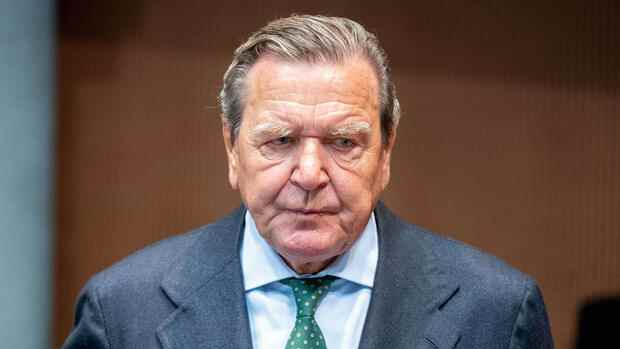The oral hearing on the SPD’s internal party expulsion proceedings against Gerhard Schröder is scheduled for this Thursday in the Kurt Schumacher House in the SPD sub-district of the Hanover region. Up to 51 representatives of the 17 SPD branches that have requested the ex-chancellor’s party expulsion because of his commitment to Russia are expected to attend the arbitration commission meeting.
Applications for Schröder’s party expulsion have come from the Heidelberg district branch of the SPD, the Würzburg sub-district and various local SPD branches in North Rhine-Westphalia, Bavaria, Lower Saxony, Baden-Württemberg, Berlin, Hesse and Saxony.
The party branches accuse the former Chancellor of causing serious damage to the SPD through his commitment to Russian state-owned companies and his failure to distance himself from Russian President Vladimir Putin.
Top jobs of the day
Find the best jobs now and
be notified by email.
However, Schröder announced in May that he would be leaving the board of directors of Russian energy giant Rosneft, and he has turned down a nomination for a seat on the board of Gazprom. Schröder continues to work for the Gazprom subsidiaries Nord Stream 1 and 2.
Schröder does not want to break off contact with Putin
Party lawyer Schönberger pointed out that the SPD’s official line on Russia in the past had by no means been so clear “that it would be easy to determine at what point the party principles were violated at all”. “On the other hand, it plays a role that Schröder himself has at least partially reduced his activities significantly, so it is questionable where serious damage can still be identified.”
>> Read also: Political scientist calls Schröder’s behavior on the Russia question “self-absorbed, stubborn and incapable of insight”
In this context, it should also be taken into account that the former chancellor was above all “accused of doing nothing”, i.e. of not distancing himself from Putin. “Here, significantly higher standards should be applied to interpret doing nothing as party-damaging behavior than if someone actively goes public themselves,” said Schönberger. This applies in particular when someone is no longer an active politician like Schröder.
Gerhard Schröder has been close friends with Vladimir Putin since his time as chancellor (1998 to 2005).
(Photo: AP)
Schröder, who has been close friends with Putin since his time as chancellor (1998 to 2005), has been criticized for years for his commitment to Russian state-owned companies. After the Russian attack on Ukraine, the pressure on him continued to increase, and the SPD leadership distanced itself.
Schröder doesn’t seem to mind that much. This week he let it be known that he wants to keep in touch with the head of the Kremlin. “I will not give up my opportunities to talk to President Putin,” Schröder told the Frankfurter Allgemeine Zeitung on Monday.
Even SPD general secretary Kühnert sees a party expulsion as critical
At the same time, the former chancellor made it clear that he did not consider supplying arms to Ukraine to be expedient: “Why are we concentrating on supplying arms?” The war could only be ended through diplomatic negotiations. “The fate of the soldiers and the Ukrainian civilian population can only be alleviated through a diplomatic solution,” said Schröder.
>> Read also: SPD leadership calls on Schröder to turn away from “warmonger” Putin
It is unclear whether Schröder wants to bring himself into play as a negotiator. In an interview with the “FAZ” he said nothing about it. However, Schröder traveled to Moscow on his own in March to talk to Putin – but without any visible success.
In the SPD, Schröder’s role is still viewed critically. Lower Saxony’s Prime Minister Stephan Weil is particularly upset that Schröder “unfortunately has not yet spoken out with the necessary clarity against Russia’s brutal, unjustified war of aggression against Ukraine”.
The co-head of the SPD-Left, Sebastian Roloff, becomes clearer. “In my view, Schröder’s statements no longer deserve comment, everything has been said about this,” the member of the Bundestag told the Handelsblatt. “His lack of distance from Putin discredits any of his assessments.”
With a view to Schröder’s possible exclusion from the party, Roloff said it was good that the proceedings were progressing with the meeting of the arbitration commission. “We have learned in the past that this is a complicated process and I trust the local arbitration board here.”
If you believe the general secretary of the SPD, Kevin Kühnert, the party will not be expelled anyway. “German party law and, by the way, the statute of the SPD do not provide for party exclusions for violent differences of opinion, provocations or business interests,” Kühnert told the “Rheinische Post” in February.
Schröder’s lawyer Michael Nagel is correspondingly relaxed about the party exclusion proceedings. There is “no factual or legal basis” for expulsion, the lawyer recently told the “Neue Osnabrücker Zeitung”.
More: Former Chancellor Schröder loses all employees in the Bundestag office
